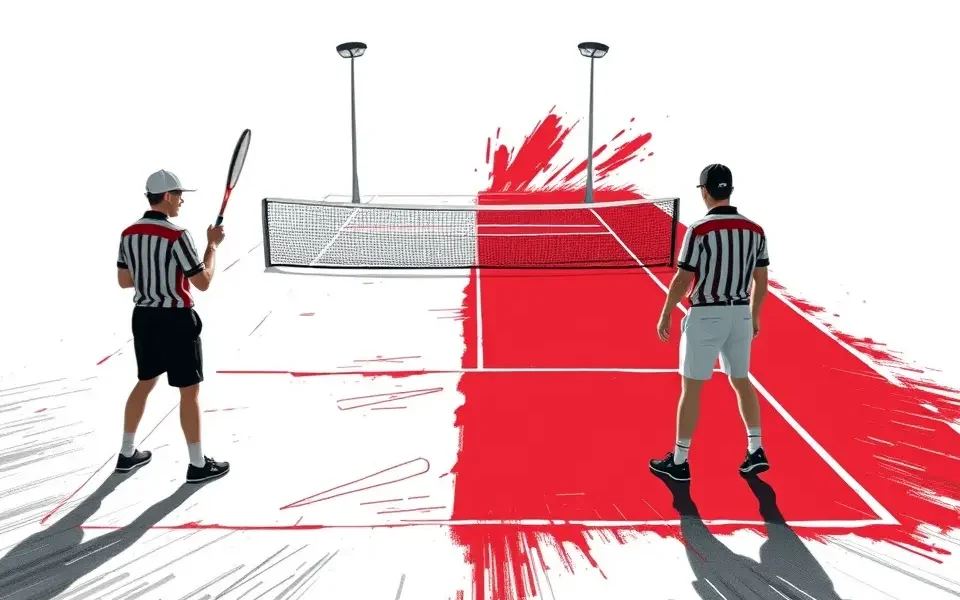Lorenzo Musetti’s recent incident at the French Open, where he kicked a ball that struck a linesperson, has sparked debate and drawn comparisons to Novak Djokovic’s infamous default at the 2020 US Open. While both involved hitting a linesperson with a ball, the outcomes were drastically different. This article explores the nuances of each situation, examining why Musetti escaped disqualification while Djokovic did not, and delves into the reactions and implications surrounding these events.
The Musetti Incident: A Moment of Frustration
During his quarter-final match against Frances Tiafoe at the 2025 French Open, Lorenzo Musetti, in a moment of frustration, kicked a ball that inadvertently hit a linesperson in the chest. The linesperson was standing approximately three meters away. Tiafoe expressed surprise and gestured towards the umpire. The umpire issued Musetti a code violation, but no further penalty was applied. Musetti went on to win the match, advancing to the next round.
Musetti immediately apologized for his actions. He stated that he was scared he might have caused harm and emphasized that there was no malicious intent behind his actions. He acknowledged the warning was justified.
The Djokovic Default: A Costly Mistake
In contrast, Novak Djokovic’s experience at the 2020 US Open ended with his default from the tournament. During his fourth-round match, Djokovic struck a ball in frustration between points, inadvertently hitting a female line judge in the throat. The line judge immediately reacted, struggling to breathe and falling to the ground.
Tournament officials held a lengthy discussion before defaulting Djokovic. The decision sent shockwaves through the tennis world, ending Djokovic’s bid for another Grand Slam title.
Key Differences in the Incidents
Several factors contributed to the different outcomes in the Musetti and Djokovic incidents:
Point of Impact
The location of the impact was a significant factor. Musetti’s ball hit the linesperson in the chest, a less sensitive area. Djokovic’s ball, however, struck the line judge in the throat, a vulnerable area that caused immediate distress.
Reaction of the Linesperson
The line judge in the Musetti incident appeared relatively unfazed by the contact. Reports indicate that she barely seemed to notice the contact. In contrast, the line judge in the Djokovic incident collapsed and struggled to breathe, indicating a more severe impact.
Intent
While neither player intentionally aimed at the linesperson, the nature of their actions differed. Musetti’s kick was a clear expression of frustration, but it seemed less directed. Djokovic’s action, while also unintentional, involved striking the ball with his racquet with force.
Rules and Discretion
Tennis rules dictate that hitting a linesperson with a ball can result in disqualification, regardless of intent. However, umpires have some discretion in applying the rule, considering the circumstances of the incident.
Reactions and Analysis
The Musetti incident has drawn mixed reactions. Frances Tiafoe described the situation as “comical,” suggesting that Musetti should have faced a harsher penalty. Former doubles world No. 1 Rennae Stubbs expressed her surprise that Musetti was not defaulted, stating that such actions should always result in disqualification.
Tennis analyst Tim Henman noted that, by the letter of the law, Musetti’s actions could have led to disqualification. However, he acknowledged the umpire’s discretion in considering the lack of intent.
The Djokovic default in 2020 also triggered considerable debate. Some argued that the default was justified, given the rules and the line judge’s reaction. Others felt the penalty was too harsh, considering Djokovic’s lack of intent and his status as a top player.
The Debate on Consistency
A central theme in the aftermath of the Musetti incident is the issue of consistency in applying the rules. Tiafoe, among others, pointed out the apparent inconsistency, questioning why Musetti received only a warning while Djokovic was defaulted for a similar, albeit distinct, infraction.
The French Open still uses human line judges, unlike many other top-level tournaments that now rely on electronic line-calling. This reliance on human judgment introduces a degree of subjectivity, which can lead to inconsistent calls and decisions.
Impact on Players and the Game
These incidents serve as a reminder of the importance of player conduct and the potential consequences of actions on court. They also highlight the challenges of maintaining consistency in officiating, particularly when dealing with unintentional acts.
For Musetti, escaping disqualification allowed him to continue his French Open campaign. However, the incident may serve as a learning experience, prompting him to manage his on-court emotions more carefully.
For Djokovic, the 2020 US Open default was a significant setback. It not only cost him a chance at a Grand Slam title but also damaged his reputation. The incident led to introspection and a renewed focus on controlling his emotions on court.
Looking Ahead
The incidents involving Musetti and Djokovic underscore the need for clear and consistently applied rules in tennis. While umpires must have some discretion to consider the specific circumstances of each case, a lack of consistency can lead to frustration and a perception of unfairness.
As tennis continues to evolve, the use of technology, such as electronic line-calling, may help reduce the reliance on human judgment and promote greater consistency in officiating. Additionally, ongoing discussions about player conduct and the application of rules are essential to maintaining the integrity of the game.
Conclusion
The contrasting outcomes of the Musetti and Djokovic incidents highlight the complexities of applying tennis rules in real-time. While both involved hitting a linesperson with a ball, the differences in impact, reaction, and intent led to vastly different consequences. The debate surrounding these incidents underscores the importance of consistency in officiating and the need for players to exercise caution and control on the court. As tennis moves forward, continued dialogue and potential technological advancements may help ensure greater fairness and clarity in the application of the rules.








No Comment! Be the first one.